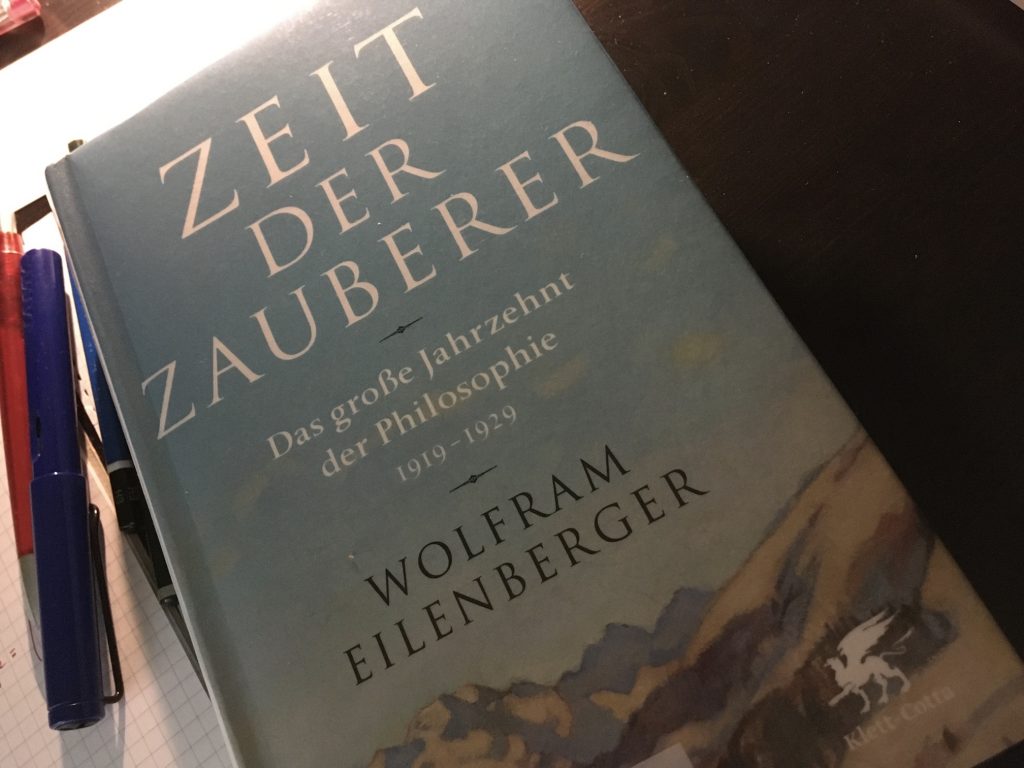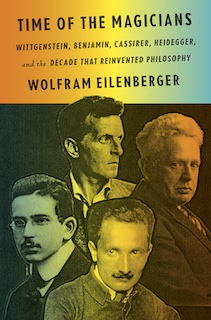Whilst in the midst of reading Wolfram Eilenberger’s book Zeit der Zauberer (2018) in German, I was interested to see that now a couple of years later an English translation has been published by Penguin Press. Not that many German non-fiction works get that far. And not that many as well reviewed – a very good review indeed by Jennifer Szalai at the NYT that hopefully encourages some good sales and thoughtful reading on that side of the Atlantic.
Certainly, I enjoyed the book immensely, and Eilenberger’s interwoven portrait of four extraordinary men – Martin Heidegger, Walter Benjamin, Ernst Cassirer, Ludwig Wittgenstein – formulating their ideas into interconnecting but individual philosophies amidst the ruins, so to speak, of the First World War and the disintegrating Weimar Republic, is told in a very winning and readable way; some German critics found it to be too so. (Enough of the Feuilletonisten here have a tendency I think to want to keep “high” culture just that!) Believe me, an awful lot of German writers struggle with what one may call ‘accessibility’ – that is, not just informing and hoping for the best, but presenting difficult subject matter such that it reads as a narrative thereby capturing the attentive reader. This, then, foremost is an immensely readable book.

There is no denying that some of the stuff is indeed difficult, or as difficult as one wants to make it; one could go barmy trying to extricate the precise and nuanced meaning, especially in terms of the references to primary sources, and the stringency of formulation and terminology is a hurdle for those without a pertinent academic background (like, guess who!). My reading, then, concentrated on the living in the time, and I conquered my irritations at just how many ways these guys came up with of saying approximately the same thing and all in the interest of justifying their (to be fair, ‘our’) existence. When I was really irritated I would mumble something along the lines of: What hocus-pocus! But they were, after all, magicians of a special sort; all occupied with their own very special brand of magical thinking!

Eilenberger’s book is framed to a great extent by a famous debate between Heidegger and Cassirer in Davos, Switzerland, on March 26 1929. (The Wiki link is very good but unfortunately only in German, but here is a review by David Nirenberg in The New Republic (January 13, 2011) of Peter E. Gordon’s Continental Divide: Heidegger, Cassirer, Davos (Harvard University Press) which provides for interesting background. There is a lot to get round, but one could conclude that dispute to be indicative of a greater split that was appearing in philosophy and academia; falling solidly along the lines of a German (völkisch, nationalist) interpretation and another that is Jewish (democratic, republican), that is, not German. Cassirer did not see beyond the intellectual argument to the gathering dark clouds on the horizon, and it is interesting that it was his wife, Toni, who through circumstance came to spend more time than she would have liked with Heidegger in the days before the debate, who saw her long held suspicions confirmed. Within a few years, Heidegger would have joined the NSDAP and the Cassirers forced into exile.
Eilenberger places Walter Benjamin as an observer at this event, and I think I am right in saying that this is a fictional additive; perhaps devised to bind more tightly Benjamin’s messy path through those years. For Benjamin, there were no Faculty debates nor networking nor competing offers for academic positions, no one radical piece of work that was on everyone’s lips. It was not that he didn’t seek a firm academic footing, sometimes with more commitment than at others, it was just that his talents and preoccupations led him to a more precarious existence; his (immense) productivity was in the private and journalistic space that he made for himself. And, there was the problematic family and wife and lovers, and mostly all at once. For him the city and street life; the urban architecture and the urban mensch – the tempo of modernity as it played out in art, in theatre, revue, cabaret, in design, photography and film. And his philosophy is political, and his politics radical. With the end of the fervour of the 1920s, Benjamin will be without permanent stand, and another ten again will lead to his own end on his own terms.
Ludwig Wittgenstein’s decade, too, is told within a frame: having enticed their errant genius back to Cambridge, Bertrand Russell and G.E. Moore concocted a quick track Ph.D. process, with the Tractatus as thesis, and that would ensure a new start for Wittgenstein in academia. In between are years of legend, always on the edge of no return; as Volksschullehrer and frustrated pedagogue in Austrian hinterland, as problem brother turned problem architect, as the lost genius sought by Russell, Maynard Keynes and co.
Here, I can’t help but mention that Wittgenstein returns in 1929 to a Cambridge intellectual circle (incl. “The Apostles”) that is as socially active as it is intellectually, and to which his singular personality can find no entry. Observe now the legendary Keynes sitting-room at King’s College: the Woolves out to play, on the hunt, licking their lips, searching for prey and there “the special one” alone in a corner, or absent again... Did he fidget like Virginia legendarily fidgeted? There is presumably no record of Virginia Woolf ever having conversed with Wittgenstein; a pity really for she would have got him – totally. And the sparks would have flown for sure; the self-educated wordsmith Woolf would have valiantly sought in plain words to defend all the possibilities of language, and her sparring partner would no doubt have countered with a heady round of word association football and his insistence that no language was able to explain the profundity of existence. Of course, this is all dependent on Wittgenstein’s prowess or otherwise in the English language, for as her Cambridge men friends had well learnt, in that respect Woolf could run rings around just about everyone. [NB from my VW diary notes: in 1923, Woolf does meet, and is impressed by, the brilliant young mathematician, Frank Ramsay, who is sent by Keynes & co. later in that very year on a mission of persuasion to Wittgenstein in Austria, and goes on to translate the Tractatus into English – and dies young.]
I should mention two other persons (amongst many on the periphery), that make star turns in Eilenberger’s book, but with extraordinary lives of their own – Hannah Arendt, as student and lover and life long correspondent of Heidegger and Aby Warburg, who found in Cassirer a kindred spirit of sorts; and played an important role in each others lives during these years. But both must wait for another time.

